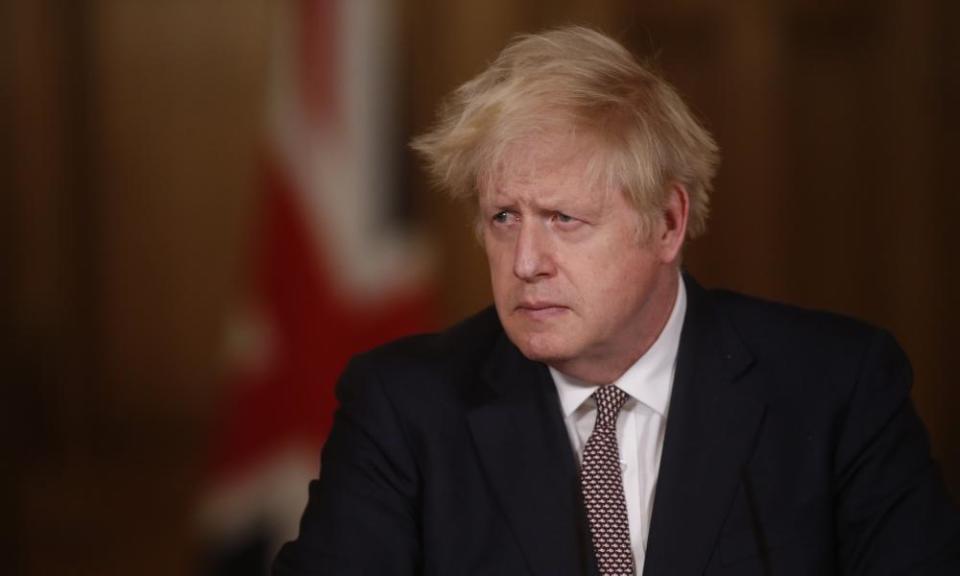Up to 70 Tories may refuse to back Boris Johnson's Covid tiers, say MPs
Watch: MPs approve new coronavirus tiers - but PM suffers major Tory rebellion
Boris Johnson faces a potentially perilous battle to get England’s new coronavirus tiers plan through parliament after dozens of Conservative MPs protested at the curbs for their areas and demanded to see the evidence behind them.
Some MPs predicted that, without significant change between now and Tuesday, when the vote on the system to replace the current England-wide lockdown takes place, as many as 70 Conservatives could vote against the plan or abstain. This could mean relying on Labour for the vote – which takes place on the day the lockdown lapses under law – to pass.
Particular vehemence came from Tories who found their areas moved from tier 1 under the pre-lockdown system to tier 2 or, in the case of Kent, to the most rigorous restrictions of tier 3 starting at 00.01 on Wednesday 2 December.
Tier 3 rules force the closure of pubs and restaurants, which can offer takeaways only, and ban indoor social mixing between households or bubbles.
“We went into lockdown at tier 1 and came out at tier 3,” said Tom Tugendhat, the senior backbencher who represents Tonbridge and Malling in Kent. “This isn’t working for us.”
Jonathan Djanogly, MP for Huntingdon in Cambridgeshire, who voted against the current lockdown, said he could oppose the government again.

“My constituency went into second lockdown, against my wishes, at tier 1 and, with great cost to the local economy, has come out of lockdown at tier 2 – am I missing something here? I will need to have this justified before voting for it.”
Former Foreign Office minister Harriett Baldwin said she had voted for the lockdown on the basis it would allow time to develop better strategies to live with Covid.
She said: “Over 23 million of us were living under tier 1 restrictions before the lockdown – that figure will be under 1 million in December. There is no logic whatsoever in having a month of lockdown only for people to have to live under an even more severe set of restrictions afterwards.”
While the government may need to rely on the opposition for the vote to pass, Alex Cunningham, Labour MP for Stockton North, said north-east England MPs were told during a call with the government that it was “unlikely” they could move to tier 2 before the new year. He said: “I can’t help but think the government have no intention of changing things for our region.”
Andy Burnham, the Greater Manchester mayor who clashed with ministers over the pre-lockdown tier 3 ruling, said he wanted the city to be moved to tier 2 after a fortnight this month, adding that the lack of extra economic support for tier 3 areas was “completely wrong”.
Other Labour leaders were openly furious. Paul Foster, head of South Ribble council in Lancashire, whose area was placed in tier 3, noted jocular scenes in the Commons during the debate on the tiers between Jeremy Hunt and Johnson, as the former health secretary welcomed the PM back from two weeks of self-isolation.
“To all the business owners out there struggling to survive; to all the pub landlords; to all the restaurants and cinemas, this is no joke,” Foster said. “This announcement could prove fatal for some businesses and that is truly devastating for both they and our communities.”
For Conservative MPs, two issues seem to be key to the discontent: the tier allocation taking place by county rather than by smaller geographical areas, and a perception that the decisions were made without clear evidence.
Watch: How England's new three-tier COVID system will work
Related: The Guardian view on England’s new tiers: dangerous juggling act | Editorial
Steve Baker, deputy chair of the new Covid Recovery Group, the primary home for Tories concerned about the scale of restrictions, said the “truly appalling” restrictions had to be fully justified.
“I am open to supporting measures where it can clearly be demonstrated that the government intervention will save more lives than it costs – as long as this data and analysis is published in full and in time ahead of any votes in parliament, so that MPs and the public have a chance to scrutinise it,” he said.
After Matt Hancock, the health secretary, announced the plans in the Commons, a series of backbench Tories stood up to complain about the decision-making process and the county-scale tier boundaries.
Others sought assurance on how areas could switch tiers. Julian Sturdy, the York Outer MP, called for the announced fortnightly reviews to take place weekly, which Hancock agreed could potentially happen.

 Yahoo Finance
Yahoo Finance 